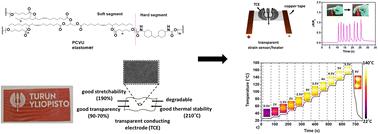当前位置:
X-MOL 学术
›
J. Mater. Chem. A
›
论文详情
Our official English website, www.x-mol.net, welcomes your
feedback! (Note: you will need to create a separate account there.)
Sustainable castor oil-derived cross-linked poly(ester-urethane) elastomeric films for stretchable transparent conductive electrodes and heaters
Journal of Materials Chemistry A ( IF 10.7 ) Pub Date : 2024-11-06 , DOI: 10.1039/d4ta05338a
Timo Laukkanen 1 , Pulikanti Guruprasad Reddy 1 , Amit Barua 1 , Manish Kumar 1 , Kristofer Kolpakov 1 , Teija Tirri 2 , Vipul Sharma 1
Journal of Materials Chemistry A ( IF 10.7 ) Pub Date : 2024-11-06 , DOI: 10.1039/d4ta05338a
Timo Laukkanen 1 , Pulikanti Guruprasad Reddy 1 , Amit Barua 1 , Manish Kumar 1 , Kristofer Kolpakov 1 , Teija Tirri 2 , Vipul Sharma 1
Affiliation

|
Substrates are essential for flexible and stretchable devices, requiring sustainability, stretchability, transparency, thermal stability, and chemical stability. This study introduces a sustainable cross-linked poly(castor oil-co-δ-valerolactone)cyclohexyl urethane (PCVU) substrate for flexible, stretchable transparent conducting electrodes (TCEs) based strain sensors and heaters. PCVU is synthesized as a highly transparent (>90%), stretchable (>190%), and thermally stable (∼210 °C) substrate via thermal cross-link polymerization of poly(castor oil-co-δ-valerolactone)triol and 4,4′-methylenebis(cyclohexyl isocyanate) on a glass mold. PCVU exhibits high chemical stability in various organic solvents and good degradability in acidic (pH 0, 45% degradation), alkaline (pH 14, 100% degradation), and phosphate buffer (pH 7.2, 9% degradation) aqueous solutions over 150 days. Using PCVU, we fabricated a robust, flexible, and stretchable TCE with low sheet resistance (<50 Ω sq−1). The TCE fabrication process involves applying an electrospun polyvinyl alcohol (PVA) layer as a temporary wet film leveling agent to improve the dispersion and adhesion of silver nanowires (AgNWs) on PCVU films, followed by a heat-based nano-welding technique to enhance the durability and mechanical stability of the TCE. The TCE-based strain sensor showed stable and repeatable resistance changes (ΔR/R0) under 5–15% strains, with fast response and consistent signal stability over 100 cycles at 5% strain. The flexible heater reached a maximum average temperature of ∼150 °C at 5.5 V, with rapid heating and cooling responses (15 s each). Practical applications include a strain sensor for real-time monitoring of human motion (finger, wrist, elbow, and neck flexion) and a heater used as a thermotherapy pad for the wrist and finger, demonstrating the potential of PCVU-based TCEs for wearable and medical devices.
中文翻译:

用于可拉伸透明导电电极和加热器的可持续蓖麻油衍生交联聚(酯-氨基甲酸酯)弹性薄膜
基材对于柔性和可拉伸设备至关重要,需要可持续性、可拉伸性、透明度、热稳定性和化学稳定性。本研究介绍了一种可持续的交联聚(蓖麻油-共δ-戊内酯)环己基氨基甲酸酯 (PCVU) 基材,用于基于柔性、可拉伸透明导电电极 (TCE) 的应变传感器和加热器。PCVU 是通过聚(蓖麻油-共δ-戊内酯)三醇和 4,4′-亚甲基双(环己基异氰酸酯)在玻璃模具上热交联聚合合成的高透明 (>90%)、可拉伸 (>190%) 和热稳定性 (∼210 °C) 基材。PCVU 在各种有机溶剂中表现出高化学稳定性,并且在酸性(pH 0,降解 45%)、碱性(pH 14,降解 100%)和磷酸盐缓冲剂(pH 7.2,降解 9%)水溶液中表现出良好的降解性,超过 150 天。使用 PCVU,我们制造了一种坚固、灵活且可拉伸的 TCE,具有低薄层电阻 (<50 Ω sq-1)。TCE 制造工艺包括应用静电纺丝聚乙烯醇 (PVA) 层作为临时湿膜流平剂,以改善银纳米线 (AgNW) 在 PCVU 薄膜上的分散和粘附,然后采用热基纳米焊接技术来提高 TCE 的耐用性和机械稳定性。基于 TCE 的应变传感器在 5-15% 应变下显示出稳定且可重复的电阻变化 (ΔR/R0),在 5% 应变下在 100 次循环中具有快速响应和一致的信号稳定性。柔性加热器在 5.5 V 时达到 ∼150 °C 的最高平均温度,具有快速加热和冷却响应(各 15 秒)。 实际应用包括用于实时监测人体运动(手指、手腕、肘部和颈部屈曲)的应变传感器,以及用作手腕和手指热疗垫的加热器,展示了基于 PCVU 的 TCE 在可穿戴和医疗设备中的潜力。
更新日期:2024-11-06
中文翻译:

用于可拉伸透明导电电极和加热器的可持续蓖麻油衍生交联聚(酯-氨基甲酸酯)弹性薄膜
基材对于柔性和可拉伸设备至关重要,需要可持续性、可拉伸性、透明度、热稳定性和化学稳定性。本研究介绍了一种可持续的交联聚(蓖麻油-共δ-戊内酯)环己基氨基甲酸酯 (PCVU) 基材,用于基于柔性、可拉伸透明导电电极 (TCE) 的应变传感器和加热器。PCVU 是通过聚(蓖麻油-共δ-戊内酯)三醇和 4,4′-亚甲基双(环己基异氰酸酯)在玻璃模具上热交联聚合合成的高透明 (>90%)、可拉伸 (>190%) 和热稳定性 (∼210 °C) 基材。PCVU 在各种有机溶剂中表现出高化学稳定性,并且在酸性(pH 0,降解 45%)、碱性(pH 14,降解 100%)和磷酸盐缓冲剂(pH 7.2,降解 9%)水溶液中表现出良好的降解性,超过 150 天。使用 PCVU,我们制造了一种坚固、灵活且可拉伸的 TCE,具有低薄层电阻 (<50 Ω sq-1)。TCE 制造工艺包括应用静电纺丝聚乙烯醇 (PVA) 层作为临时湿膜流平剂,以改善银纳米线 (AgNW) 在 PCVU 薄膜上的分散和粘附,然后采用热基纳米焊接技术来提高 TCE 的耐用性和机械稳定性。基于 TCE 的应变传感器在 5-15% 应变下显示出稳定且可重复的电阻变化 (ΔR/R0),在 5% 应变下在 100 次循环中具有快速响应和一致的信号稳定性。柔性加热器在 5.5 V 时达到 ∼150 °C 的最高平均温度,具有快速加热和冷却响应(各 15 秒)。 实际应用包括用于实时监测人体运动(手指、手腕、肘部和颈部屈曲)的应变传感器,以及用作手腕和手指热疗垫的加热器,展示了基于 PCVU 的 TCE 在可穿戴和医疗设备中的潜力。







































 京公网安备 11010802027423号
京公网安备 11010802027423号